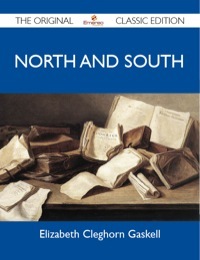You need to sign in or sign up before continuing.
Take a photo of a barcode or cover
emotional
slow-paced
Plot or Character Driven:
Character
Strong character development:
Yes
Loveable characters:
Yes
Diverse cast of characters:
Yes
Flaws of characters a main focus:
Yes
Re-read with Victorians! group
Having loved it back in 2007 when I read it first, it was with trepidation that I re-visited this classic. Would it still move me? Yes is the answer, and actually I got a lot more from this re-reading than expected.
Gaskell starts with pure storytelling. We are introduced to our heroine, Margaret Hale, in London, with her aunt and cousin, in the middle of marriage arrangements. From the beginning, she is a fascinating character, both complex and realistic. What seems at first a typical 19th century novel of manners soon becomes something else. Locations change and the author very adroitly adds a variety of social concerns to her tale, focusing on the industrial revolution and the relationships between the classes, turning it into a huge canvas with a great cast. Idyllic village life in the South is juxtaposed with the manufacturing North, but also the capital (seat of government) and Oxford (academic heart). Questions on faith/morality and authority/rebellion permeate everything and everyone. All the main characters seem to be faced with doing what they know is (morally) right but wrong in the eyes of the law, faith, or social rules.
All this may have turned the novel into a dry text, but on the contrary Gaskell succeeds in merging all these different elements into a coherent whole. In fact, better than that. While using different points of view, both of the workers and of the mill owners, she still makes sure that the characters do develop, especially Margaret, and that the narrative carries on. However much I wanted to keep an eye on what the author was doing, I kept being taken by the narration, flicking through the pages to see what was going to happen (although I knew!).
This re-reading of North and South and group discussions have made me appreciate and understand this novel to another level. Yes it does give much food for thought but can also be enjoyed as a great story.
Having loved it back in 2007 when I read it first, it was with trepidation that I re-visited this classic. Would it still move me? Yes is the answer, and actually I got a lot more from this re-reading than expected.
Gaskell starts with pure storytelling. We are introduced to our heroine, Margaret Hale, in London, with her aunt and cousin, in the middle of marriage arrangements. From the beginning, she is a fascinating character, both complex and realistic. What seems at first a typical 19th century novel of manners soon becomes something else. Locations change and the author very adroitly adds a variety of social concerns to her tale, focusing on the industrial revolution and the relationships between the classes, turning it into a huge canvas with a great cast. Idyllic village life in the South is juxtaposed with the manufacturing North, but also the capital (seat of government) and Oxford (academic heart). Questions on faith/morality and authority/rebellion permeate everything and everyone. All the main characters seem to be faced with doing what they know is (morally) right but wrong in the eyes of the law, faith, or social rules.
All this may have turned the novel into a dry text, but on the contrary Gaskell succeeds in merging all these different elements into a coherent whole. In fact, better than that. While using different points of view, both of the workers and of the mill owners, she still makes sure that the characters do develop, especially Margaret, and that the narrative carries on. However much I wanted to keep an eye on what the author was doing, I kept being taken by the narration, flicking through the pages to see what was going to happen (although I knew!).
This re-reading of North and South and group discussions have made me appreciate and understand this novel to another level. Yes it does give much food for thought but can also be enjoyed as a great story.
emotional
reflective
relaxing
medium-paced
Plot or Character Driven:
Character
Strong character development:
Yes
Loveable characters:
Yes
Diverse cast of characters:
Yes
Flaws of characters a main focus:
Yes
Well written and kept me invested but ended too abruptly
emotional
reflective
slow-paced
emotional
reflective
sad
slow-paced
Plot or Character Driven:
Character
Strong character development:
Yes
Loveable characters:
No
Diverse cast of characters:
No
Flaws of characters a main focus:
Yes
reflective
slow-paced
medium-paced
Plot or Character Driven:
A mix
Strong character development:
Yes
Loveable characters:
Yes
Flaws of characters a main focus:
Yes
I didn't like this book.
One of my friends here on goodreads compared this book to Pride and Prejudice without the comedy, and I can't say I disagree, but where she meant it as (I think) a compliment, I mean it as a criticism.
I think a big part of my dislike for this book comes from my expectations going in. For whatever reason, I thought this book was going to be a lot more focused on the clash between Margaret's compassion for the striking mill workers and Mr. Thornton's stubborn inability to change his mind about anything. Which it kind of was, but so much more of the focus of this book was on Margaret dealing with leaving London to live with her parents after nearly a decade away, her father renouncing his faith and resigning his parish with the Church of England, having to move to a Northern industrial town far from the countryside she's used to, being lonely, discovering the reason her brother is in exile in Spain, discovering that her mother is gravely ill (probably with tuberculosis or some other form of consumption; although it's never outright stated the coughing gives it away) many, many deaths in quick succession, including. She also turns down two perfectly good proposals because she has no interest in marriage, including one from Thornton, who would make a pretty solid husband, in my opinion, and who might have been more easily swayed to indulge his fiancee as regards the mill workers than to listen to a woman who turned him down.
I also didn't find the prose particularly compelling. I don't mind the kind of melodrama found in this book, in fact, at certain times of life I crave it, but Gaskell's writing just seemed lackluster, and lacking wit. Other contemporaries of hers I've read and enjoyed, and even Jane Austen's most grim novel, Mansfield Park kept me riveted and was so well written it's now a favorite, but the difference is that Austen genuinely sympathizes with her heroines, while Gaskell seemed only to give Margaret a happy ending because she was expected to do so, and not because she actually thought it made sense as an ending to one of the bleaker stories I've read.
I don't hate this book, though. There are aspects of a really great novel here, and I'm more angry at the missed potential than annoyed at the book itself.
One of my friends here on goodreads compared this book to Pride and Prejudice without the comedy, and I can't say I disagree, but where she meant it as (I think) a compliment, I mean it as a criticism.
I think a big part of my dislike for this book comes from my expectations going in. For whatever reason, I thought this book was going to be a lot more focused on the clash between Margaret's compassion for the striking mill workers and Mr. Thornton's stubborn inability to change his mind about anything. Which it kind of was, but so much more of the focus of this book was on Margaret dealing with leaving London to live with her parents after nearly a decade away, her father renouncing his faith and resigning his parish with the Church of England, having to move to a Northern industrial town far from the countryside she's used to, being lonely, discovering the reason her brother is in exile in Spain, discovering that her mother is gravely ill (probably with tuberculosis or some other form of consumption; although it's never outright stated the coughing gives it away) many, many deaths in quick succession, including
Spoiler
both her parents and her best friend since coming to MiltonI also didn't find the prose particularly compelling. I don't mind the kind of melodrama found in this book, in fact, at certain times of life I crave it, but Gaskell's writing just seemed lackluster, and lacking wit. Other contemporaries of hers I've read and enjoyed, and even Jane Austen's most grim novel, Mansfield Park kept me riveted and was so well written it's now a favorite, but the difference is that Austen genuinely sympathizes with her heroines, while Gaskell seemed only to give Margaret a happy ending because she was expected to do so, and not because she actually thought it made sense as an ending to one of the bleaker stories I've read.
I don't hate this book, though. There are aspects of a really great novel here, and I'm more angry at the missed potential than annoyed at the book itself.
dark
emotional
sad
tense
medium-paced
Plot or Character Driven:
A mix
Strong character development:
Yes
Loveable characters:
Complicated
Diverse cast of characters:
No
Flaws of characters a main focus:
Yes





